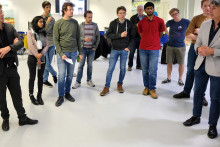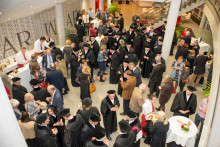After a talk by guest speaker Professor Wim Voermans (University of Leiden), groups of students attempted to design a modern constitution during a workshop. Having emerged into Society 5.0, the ‘super-smart society’, we no longer just control technology like we used to. Rather, technology also perceives and interacts with us. Technology is affecting humankind. Robots are being taught to feel pain and the first ‘human-pig hybrid’ has been created. ‘Should the robot then be given rights? Should the hybrid be treated as an animal or a human? How can the 21st century constitution be amended to accommodate these dilemmas posed by modern technology?’ These questions by Peter-Paul Verbeek opened this first event of the Week of Inspiration.
Sense of belonging
‘The constitution delineates an idea that we belong to a group,’ Professor Voermans explained. ‘It is this sense of identification and feeling of belonging to a group that makes the idea of a constitution so popular.’ According to him, mobilization of people among other reasons including economic interests and political strategies can explain why there are so many constitutions all over the world. Despite the popularity of the constitution, the question ‘Why doesn’t one global constitution exist?’ remains unanswered and is a conundrum that continues to puzzle him.
Polarization
After the talk by Voermans, audience members pooled together to work on various possible challenges that a modern, 21st century constitution could potentially face. These included ‘polarization’ – inequalities in for instance wealth, power and resources. The groups also discussed the idea of a ‘global’ constitution, rights and duties towards nature, ownership of the digital self, the rise of populism and many more possible challenges.
Common ground: protect our data
In four groups, the audience came up with possible rights to address the challenges discussed. One group concluded with the right to anonymize data and the representation of animals using a human agency as an intermediate. The second group rounded off with the involvement of people in decision making which invited several contradictory remarks including the dangers of a referendum, the challenges of transparency and finding a good educated representative. The third group formulated a constitutional rule: ‘The unauthorized access to personal data is prohibited’. Similar conclusions of data regulations were drawn by the fourth group. With data as the ‘gold’ of the 21st century, all the groups seemed to have one common takeaway: to constitutionalize data protection.







